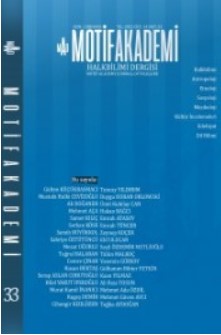RUS BEŞLERİ’NİN ORYANTALİZME ETKİSİ VE M. BALAKİREV’İN “SELİMİN ŞARKISI”NIN İNCELENMESİ
THE EFFECT OF MIGHTY HANDFUL ON ORIENTALISM AND THE INVESTIGATION OF M. BALAKIREV'S SONG OF SELIM
Author(s): Tülün MalkoçSubject(s): Cultural history, Customs / Folklore, Music, 19th Century, History of Art
Published by: Motif Halk Oyunları Eğitim ve Öğretim Vakfı
Keywords: Orientalism; romance; the mighty five; nationalism; Balakirev;
Summary/Abstract: Eastern music always attracted Russian composers, as Russia, which settled between the West and the East from geographical point of view, remained at the distinction of these two cultures. Glinka, who laid the foundations of the Russian opera, and the pioneering Russian composers of the eastern motifs Aliabyev and Dargomozhsky, are ethnographically striking. Then, in the 19th century, the The Five formed a school by the movement of Orientalism in the works of the national composing school, and it was able to reveal Russian classical music in the context of traditional music understanding. The spiritual value given to “The Mighty Five” "Russian Orientalism" and other cultures and folklore of other peoples, which entered the musical history as a national trend, could also be foregrounded. Russian Five; In this study, the Mighty Five (Moguchaya Kuchka) were examined and Balakirev's work named Selim's Song was examined and its connection with orientalism was revealed. “Selim's Song”, one of the first examples of Balakirev's oriental-themed song, was composed in 1858, four years before Balakirev's trip to the Caucasus, and on Lermontov's poem which is Ismail Bey.
Journal: Motif Akademi Halkbilimi Dergisi
- Issue Year: 14/2021
- Issue No: 33
- Page Range: 333-347
- Page Count: 15
- Language: Turkish

